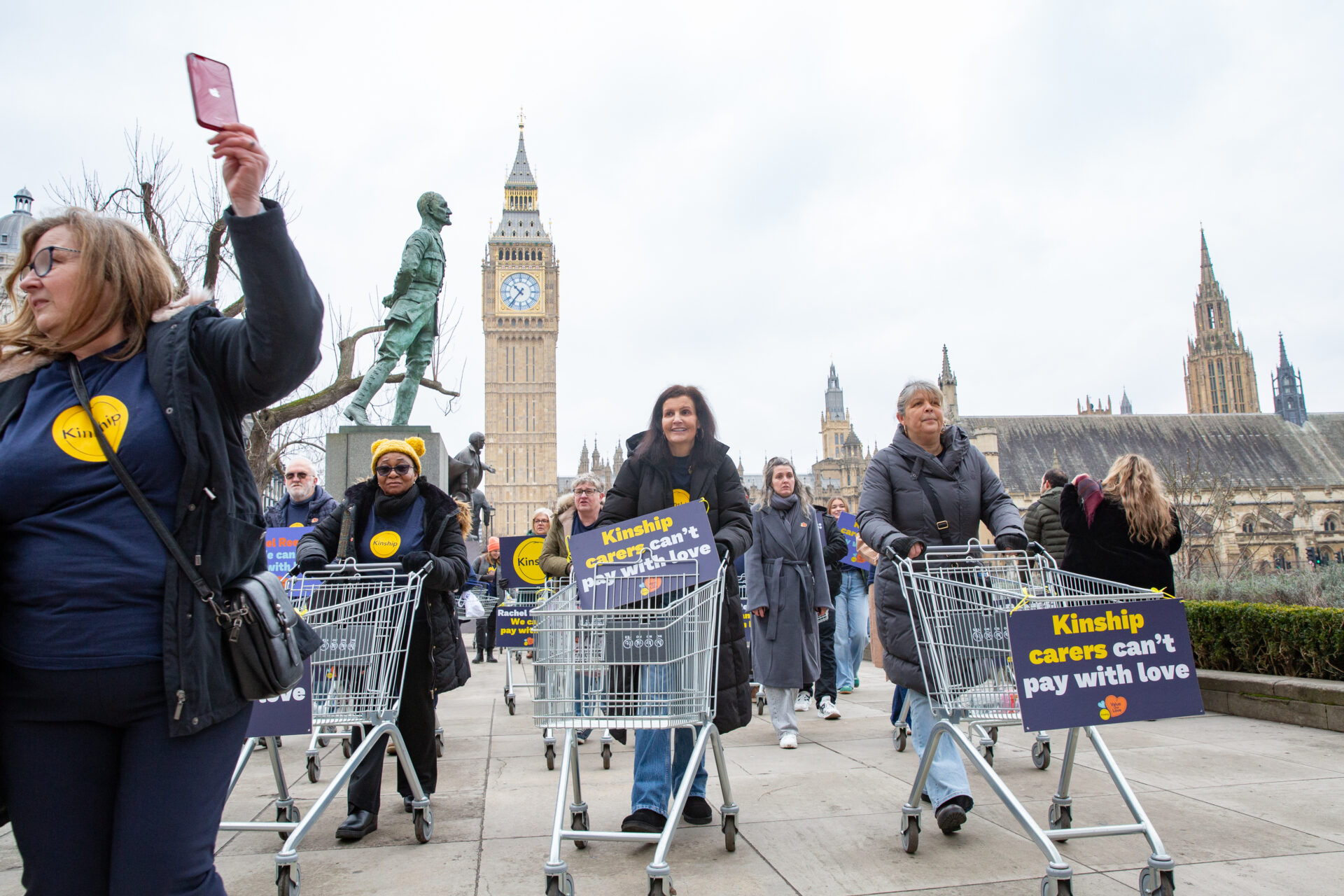
Kinship is pleased that the government is today finally revealing more details about the long-awaited £40 million pilot of financial allowances for kinship carers in up to 10 local authority areas in England, following last week’s Spending Review.
We await further information about the Kinship Allowance Pilot, including when it will begin and participating local authorities.
Slow progress
Previous status: No progress (October 2024); Slow progress (October 2024)
Click on the link below to take you to the section you'd like to read:
The government announced on 17 June 2025 details of the long-awaited Kinship Allowance Pilot (KAP) following a commitment made in the Autumn Budget 2024. The pilot will provide financial support for eligible kinship carers in up to 10 local authority areas, paid at an equivalent rate to the fostering National Minimum Allowance (NMA), to understand how improved financial support for kinship carers helps to minimise the risk of kinship placement breakdown, enables kinship families to consider arrangements outside of the care system, and subsequently alleviate cost pressures on local authorities.
The KAP expression of interest has closed. The governement’s original published timeline suggested successful local authorities would be informed in September 2025, but no further updates have been shared. We have compiled Frequently Asked Questions specifically for kinship carers which will be reviewed and kept up to date as we learn more.
The government has confirmed that “decisions about future national rollout will be informed by the findings of the evaluation” and that, whilst their “ambition is that all kinship carers will get the support they need to care for the children they support… it is important that the DfE first builds an evidence base to find out how best to deliver financial support for kinship families and that is why we are piloting this programme.”
Some local authorities already deliver a consistent, non means tested financial allowance for some groups of kinship carers (most commonly special guardians where the child was previously looked after) and several local authorities have recently announced plans to strengthen their offers of financial support to kinship carers, including Kirklees, Leeds and Sheffield. However, most local authorities continue to deliver only discretionary means tested financial support to some kinship carers (other than kinship foster carers).
The previous government committed in the National Kinship Care Strategy to delivering a 4-year financial allowances pathfinder in up to 8 local authorities from 2024 to28, with £16 million funding committed to for year one (2024-5). Only special guardians where the child was previously in care were due to be eligible for an allowance which matched the minimum fostering allowance in that local authority. Although further details were expected in Spring 2024, the then government’s response to a parliamentary written question suggested a delay even prior to the general election being called.
Previously, Stable Homes, Built on Love committed in February 2023 to “explore the case for mandating” a mandatory financial allowance across all local authorities. This followed the Independent Review of Children’s Social Care’s recommendation in 2022 that financial allowances be extended to all special guardians and kinship carers with child arrangements orders where the child would otherwise be in care. The government agreed with Review’s assessment that the current system “perversely incentivises” kinship carers to become foster carers given this can be the only route to access financial support, and acknowledged this can be a barrier to permanence for children who would otherwise be cared for under a different legal order.
In Stable Homes, Built on Love, the government argued that improving financial support “often makes good financial sense for local authorities, kinship carers and, ultimately, for children and their outcomes”. It argued the provision of flexible funding for kinship arrangements makes economic sense, noting that some local authorities had seen a financial benefit – particularly where this has reduced the numbers of children in care – and encouraged others to follow suit: “we do not want local authorities and partners to feel the need to wait for permission to act now… [local authorities] should feel confident to pursue approaches and ways of working that we know are the right ones”.
Several independent parliamentary and other bodies have also recommended improved financial support for kinship carers. The Lords Public Services Committee in 2023 encouraged the government to “ensure that sufficient financial support for those caring for their kin is provided regardless of whether the arrangement is formal or informal, and that it is consistent across England. Additional funding should be allocated to local authorities to provide this support in the immediate future.” In July 2025, the Education Committee recommended the government “evaluate the pilot at the earliest opportunity and roll it out across the country once it has proven to be effective”.
We are pleased the government is moving ahead with plans to trial improved financial support for kinship carers given our extensive evidence of the impact of poor financial support on kinship family poverty and stability. However, it is vital that the trial does not paralyse progress towards a wider rollout of allowances and financial support in the future. We also remain concerned that informal kinship families will continue to be excluded from any policy progress on financial support given our and wider evidence they are the least likely to be recieiving support whilst having very similar needs and experiences of financial insecurity to other families.
The government’s rationale for an extended pilot – rather than the introduction of a mandatory financial allowance across all local authorities as called for by our #ValueOurLove campaign – is that it needs to first understand further how consistent financial support helps to keep children within their families and in kinship arrangements outside of local authority care, and to test how best to deliver the allowance in practice.
However, we know that local authorities who have already moved to equalising financial support between kinship carers and foster carers are doing so because of the positive experiences and outcomes it delivers for children, families and their budgets. In the meantime elsewhere, financial support for kinship families across the country will remain inadequate and extremely variable, subject to a postcode and legal lottery. It makes sense to invest in kinship care: our evidence shows that, for every 100 children looked after in well-supported kinship care rather than local authority care, the state saves £4 million per year and increases the lifetime earnings of those children by £2 million.
We were pleased to see our direct expertise and campaigning reflected in the pilot’s aims and eligibility, including:
We welcome those local authorities who have followed the evidence and already deliver leading practice in financially supporting special guardians and other kinship carers. Elsewhere, guidance on the provision of financial support for kinship carers continues to be misunderstood and delivered poorly – and sometimes unlawfully – in practice, leading to highly variable experiences for kinship carers and leaving local authorities open to legal challenge, evident in a number of recent successful judicial challenges and Ombudsman complaint decisions.
We urge the Department for Education to work transparently and at pace to initiate the pilot so that kinship carers across England can understand how it might impact them, and to use early findings to iteratively improve delivery of the pilot and to understand how it might inform a wider rollout in the future.
Ultimately, we want to see a commitment made by the government to legislate for and appropriately fund a consistent offer of financial allowances nationally for more kinship carers. This should sit alongside further investment in and rollout of wider reforms, including family network support packages, which could provide the legal, financial and practical vehicle for enhanced financial support for some kinship families – particularly those with less formalised arrangements.
Regardless of if they are selected to be part of the pilot, local authorities should emulate the leading practice of local authorities who already deliver a non-means tested allowance to kinship carers as soon as possible, and ensure financial issues do not prevent kinship carers from moving to a kinship arrangement best suited to their family situation. This aligns with Foundations’ Kinship Care Practice Guide which recommends that kinship carers should be offered a financial allowance “to increase placement permanency, reduce the likelihood of placement disruption and improve the likelihood of permanent guardianship”.
To support this, the government should harness the momentum of the pilot and commit to updating special guardianship guidance to reduce current unacceptable variation and poor practice in the delivery of financial support, reiterating that “financial issues should not be the sole reason for a special guardianship arrangement failing to survive” and offering clarity to local authorities in the absence of an up-to-date and suitable means testing model. Guidance should also encourage equitable provision of suitable financial support to kinship carers with child arrangements orders. Local authorities should offer support to kinship carers with these arrangements who wish to move to special guardianship when in the best interests of the child.
£4.3 billion the economic value of kinship care in England per year
Half of kinship foster carers say they would move to other arrangements if an equitable financial allowance was guaranteed
Twice as likely as UK adults to be using credit more than usual

Kinship is pleased that the government is today finally revealing more details about the long-awaited £40 million pilot of financial allowances for kinship carers in up to 10 local authority areas in England, following last week’s Spending Review.

Our analysis of government data and survey insights highlight the positive impacts which improved financial support would bring for families and the state.

On 12 February 2025, over 30 kinship carers marched to the Treasury to demand a financial allowance for all kinship carers. Find out what prompted this action.